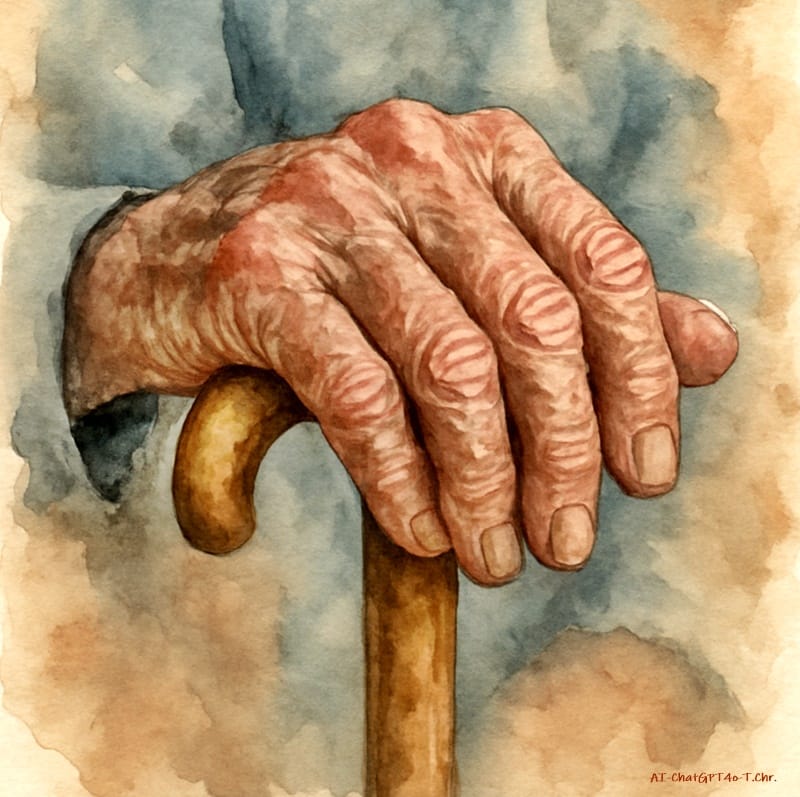THE WISDOM OF THE OLD HAND

By AI-ChatGPT4o-T.Chr.-Human Synthesis-13 June 2025
The old hand, curled softly around the polished cane, is more than skin and bone—it is a library of silent stories.
Once, it was a boy’s hand, clumsy and curious, chasing frogs through the reeds and rubbing sleep from bright eyes that saw wonder in everything. That same hand held a mother’s fingers tightly on the first day of school, then trembled years later as it gripped the cold railing of a ship bound for war.
It has carried burdens—literal and unseen. It lifted sacks of grain, swung hammers into stubborn wood, and wiped away the sweat of labor that built homes and fed families. It bore wedding rings and held newborns, learning the gentle strength required to protect without possessing.
There are scars on that hand—some visible, others buried in the knuckles’ quiet stiffness. They mark loss, heartbreak, hard decisions, and days where it had to let go of what it loved. Yet it always found its way back to balance, resting again on that golden cane like a symbol: not of weakness, but of earned rest.
The veins now rise like old riverbeds under parchment skin, mapping a long journey. It doesn't seek attention. It doesn't preach. But if you sat quietly beside it long enough, you’d hear what it has to say—without a word.
It would tell you that nothing lasts, and that's the beauty of life. That joy and pain are both best held loosely. That time takes much, but leaves behind something far more valuable: wisdom—not the loud kind found in books or speeches, but the soft kind that dwells in stillness, in knowing, in accepting.
The old hand doesn’t point anymore. It offers. It supports. It blesses.
It teaches us, in its stillness, what it means to truly live.
That is the wisdom of the old hand.
It rests now—lightly but assured—on the cane, as though it no longer needs to hold tightly to anything. The hand has done its part. It has shaped lives, weathered storms, and extended itself countless times in compassion, anger, hope, and forgiveness.
People pass by and see only age. But look closer, and you'll find time etched like calligraphy across its surface.
Each line whispers a secret:
"Here is where I held my father as he died."
"This scar is from the nail I drove into the roof to keep the rain out of our first house."
"These knuckles remember gripping the letter that told me my brother wouldn’t return from the front."
"And these fingers once traced the curve of my wife's cheek on a quiet Sunday morning, when the world was still."
Yet there is no bitterness in this hand. No demand for recognition. Only peace.
When the grandchildren visit, their small, unlined fingers clasp around the old one without fear. They do not see wrinkles or wear. They feel the warmth. They sense the quiet gravity, as if touching this hand connects them not only to a man but to a history, a legacy stretching backward like roots into rich, unseen soil.
There is something deeply sacred in such a hand. Not in its flesh or bone, but in what it has chosen to hold onto and what it has learned to release.
We live in an age obsessed with speed, with youth, with surface beauty. But the hand reminds us: slowness has depth. Age has poetry. And a hand that has touched both love and loss, war and peace, work and play, becomes—without ever meaning to—holy.
One day it will loosen its grip for the last time. The cane will fall gently to the floor. But the wisdom will remain, passed invisibly into every life it touched.
And when we, too, become the elders with hands lined like rivers, may we hope they will rest just as gently—on memory, on love, on gold—and may someone, somewhere, call our hands wise.
THE PERSON BEHIND THE OLD HAND
Look again at the old hand.
It seems at first to belong to one man. But no—this hand has worn many faces, many names. It is not just one hand; it is every hand.
It is the baker’s hand, dusted in flour, warm from shaping loaves before dawn, feeding a village that never knew his name.
It is the butcher’s hand, firm and precise, red to the wrist, doing the grim work others shy from.
It is the artist’s hand, trembling with creation, drawing meaning from silence with strokes of madness and beauty.
It is the mother's hand, wiping fevered brows, braiding hair, waving goodbye with a smile hiding fear.
But it is also the hand of cruelty.
It is the hand that signed decrees that sent thousands to death.
The hand that struck without reason.
The hand that pulled triggers in rage, or pointed fingers in judgment, or gripped power until it crushed everything beneath it.
It is the president’s hand raised in solemn oath, and the dictator’s hand raised in violent salute.
The thief’s hand, the priest’s hand, the surgeon’s, the beggar’s.
It is the hand of saints and tyrants, of poets and liars, lovers and betrayers.
And yet—here it rests, stripped of title and memory, aged equally by time.
Time, the great equalizer, has smoothed every ambition into skin.
It does not care who the hand once belonged to. It only asks: Did it learn?
Did it change? Did it lift others up, or press them down? Did it seek control—or connection?
In this hand’s stillness is the weight of all hands.
It reminds us that none of us are wholly good, nor wholly evil—that each of us contains the potential for both.
What separates us is not the role we play, but what we choose to do when our hand holds power—or tenderness.
And so the hand rests.
It has been many things—useful and terrible, generous and cold. But in its final pose, it is humble. It no longer grasps. It no longer demands. It simply rests—perhaps for the first time without pretense.
That is the wisdom now.
That in the end, we are not remembered by the name that owned the hand, but by what that hand gave, what it built, what it touched—and what it finally let go.
A Philosophical Ending to The Wisdom of the Old Hand
In the end, the hand teaches us what no book fully can: that life is not meant to be conquered, only carried—gently, consciously, with grace.
We arrive with open hands, grasping at the world in wonder. We live with clenched fists—fighting, building, holding fast to what we fear to lose. And if we are fortunate, we leave with our hands once more open, not in surrender, but in understanding.
The hand resting on the cane is not a symbol of weakness, but of transcendence. It is the quiet culmination of a human life lived fully—where the need to prove has given way to the desire simply to be.
Its stillness is not emptiness, but fullness beyond form.
Here lies the essence of wisdom: that meaning is not found in the strength of the grip, but in the willingness to release. That the hand, once an instrument of will, becomes at last a vessel of presence.
And so the hand rests—on golden wood, in golden light—not holding on, but letting be.
This is the final lesson of the old hand:
That in the long arc of time, what endures is not what we seized, but what we gave.
Not what we shaped, but what we touched.
Not the battles we won, but the lives we held, even for a moment.
And in this, the hand is not old—it is eternal.
